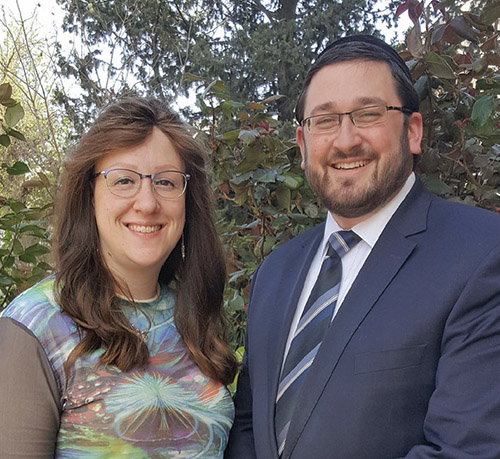
When speaking with Yosef Platt, it is impossible to ignore how he looks at his wife, Racheli. When she talks, his face radiates pride and it’s clear he is listening to her every word. At one point when asked a question, with a shy, deferential smile, he points to Racheli and says, “You should ask her, she’s better at this than me.”
The couple were discussing their union and how, once Yosef completes his fifth and final year at the Center for Kehilla Development, they are eager to show members of their new community the beauty in strength of honoring shalom bayis, the Jewish notion of harmony in the home.
“The Center for Kehilla Development has been a very fulfilling experience for both of us. It’s had a tremendous impact on our family, especially when it came to learning about building strength of character,” Racheli said, explaining the added value of the rabbinic program.
The program, based in the Jerusalem Ramat Eshkol neighborhood, has adopted many radical, outside-the-box approaches to rabbinical education. Where other than at the CKD can a rabbi receive a curriculum that provides EMT training, social work and Dale Carnegie courses in addition to their traditional biblical scholarly studies?
The diverse curriculum was crafted so that when these rabbis are placed in Jewish communities around the world, they are not just someone seen during Shabbat services; rather, they are to be effective year-round and in a variety of situations. Considering one the biggest problems plaguing communities is strife inside the home—41% of all marriages in the United States end in divorce—having a rabbi who, along with his wife, can serve as a sounding board is critical.
“Besides the agony, psychological scars and financial damage suffered by the divorcing spouses, there is often collateral damage, especially to children,” CKD’s dean, Rabbi Lawrence Kelemen, explained. “Given the wealth of wisdom the Torah offers on how to create and maintain a thriving happy marriage, rabbinic couples can and should play a central role in resolving this crisis. So the CKD provides rigorous training for its couples in this area.”
What’s more, by educating the wife as well, she is given an empowering platform to serve the community in her own right.
For Racheli, this is a task she has taken to heart. “The most important thing is to work on yourself and lead by example,” she said. The two strive to uphold the tenets of shalom bayis every day, as it not only provides the guidelines for a happy and healthy home, but is critical to following halacha.
“Shalom bayis is an extremely important ingredient to a Torah lifestyle. One’s character in that arena is directly related to one’s status in the next world. It’s a litmus test of judging one’s character, if you will,” Yosef said.
CKD also helps these couples understand that marriage is a beautiful and awe-inspiring ritual—if followed properly.
“I went into marriage thinking it’s a partnership, like a business deal. But Kelemen opened our eyes to deeper Torah wisdom. My attitude is now, ‘How am I’m going to make this person’s life the best it could possibly be?’ No strings attached. It will be impossible for anything to break this bond,” Avrami Teitelbaum said, beaming, while sitting next to his wife, Rivka.
Michal and Yehoshua Blumstein are also grateful for CKD’s training with regard to child rearing as well. Yehoshua is also appreciative that they received this training at the same time and learned to grow together as a united front.
“The fact that both of us are being taught the same thing at the same time is a big deal. If I was learning chinuch and started telling her what to do, that would not work and it shouldn’t work. It’s good that we grow and understand together. That makes things smoother. We’re on an even keel,” he said, as Michal looked on nodding in agreement.
So once their studies are complete, these families will get to work enriching and instilling family values in their communities. Certainly not an easy task. Ironically, though, advice on how to have a peaceful home and life is written in black and white in the Torah for all to see. CKD couples, then, are well-trained conduits for that valuable information.
“People need to see a good stable family. And the Torah explains how to do that.” Yehuda and Ilanit Schor, said. “The main goal in CKD is to be there to help people be a good example. And, hopefully, people will be able to share what’s on their mind and we’ll always be there to listen.”
By Noa Amouyal










